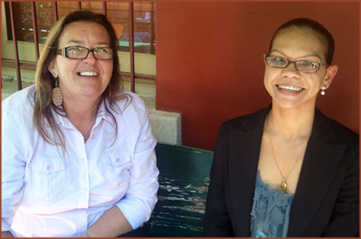15.03.2011
Cultural awareness training
 Photo: Senior Legal Officer, Virginia Marshall, and cultural awareness trainer, Lani Blanco-Francis
Photo: Senior Legal Officer, Virginia Marshall, and cultural awareness trainer, Lani Blanco-Francis
In November 2010, in accordance with the ALRC Reconciliation Action Plan (RAP), all staff attended a full day of cultural awareness training. Held at Tranby Aboriginal College in Glebe, the day was facilitated by cultural appreciation trainer Lani Blanco-Francis from the Arrilla Indigenous Consultants and Services group. The program involved sessions on Indigenous culture, culturally appropriate consultation and community engagement, the role of the ALRC’s Indigenous Advisory Committee and reviewing the ALRC’s RAP.
The day commenced with introductions, with each staff member sharing their cultural background and level of understanding/knowledge of Indigenous peoples in Australia. Sessions focused on fostering a deeper understanding of Indigenous culture, including appreciation for cultural beliefs and differences, behaviour and traditional kinship knowledge. We discussed how the ALRC could expand this cultural understanding to Indigenous consultations held at various stages of our inquiries. Staff and the facilitator worked through intensive case studies on community consultations and how to provide effective feedback to the community.
Through case studies and group work, staff identified opportunities to further the ALRC’s engagement with Indigenous networks. In addition, there was a keen group discussion on the consultation process and delivering appropriate information to a diverse Indigenous community.
Overall the day was stimulating and provided a useful basis upon which the RAP Committee and the ALRC more broadly can continue to develop the RAP and engage with the Indigenous community.
Providing feedback to the Indigenous community
One issue identified during the Family Violence Inquiry and highlighted in the cultural awareness training is the need for the ALRC to better provide feedback to the Indigenous community.
Following the launch of the Final Report for the Family Violence Inquiry, ALRC President Rosalind Croucher prepared a podcast on Indigenous issues and consultation in the Family Violence Inquiry. The podcast is available on the ALRC website: https://www.alrc.gov.au/news-media/family-violence/podcast-indigenous-issues-and-consultation-family-violence-inquiry.
To provide additional feedback and encourage greater participation by Indigenous people in the law reform process, Legal Officer Amanda Alford and the President also wrote an article for publication in Indigenous Law Bulletin (Volume 7 Issue 22), re-published here on the ALRC website: ‘The ALRC and Indigenous People—Continuing the Conversation’.
RAP milestones
In November 2010, the ALRC welcomed its first Indigenous staff member, Senior Legal Officer Virginia Marshall. This has led the way for a further RAP action (3.1) to evolve, in view of Indigenous employment strategies, and further confirms the ALRC’s commitment to encouraging greater participation by Indigenous peoples in law reform.
Virginia has law degrees from the University of Wollongong and the ANU and in 2010 completed a doctoral thesis in Law at Macquarie University. Virginia holds a practicing certificate in NSW as a solicitor to the Supreme and High Courts and has worked as a para-legal and solicitor in the civil and criminal section of Legal Aid. She has been a lecturer and a research associate, and most recently was employed as a Senior Research Fellow with the Nyikina Mangala Aboriginal Corporation in WA to research, report and implement sustainable economic livelihoods on traditional country in the Kimberley region. Virginia spent two years as the CEO of the NSW Aboriginal Water Trust, NSW Dept of Natural Resources and was also an Indigenous Research Associate at the Federal Court in Sydney.
